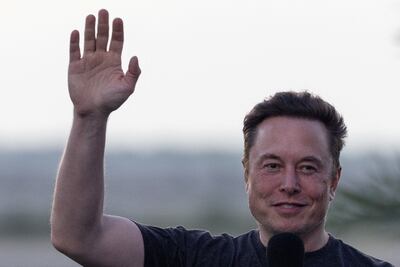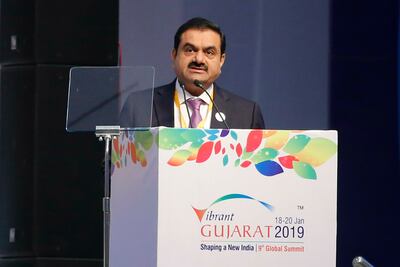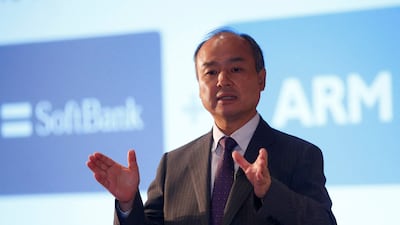Masayoshi Son
Masayoshi Son has quietly tightened his grip on SoftBank Group, edging closer to the point where he could bid to take the world’s largest technology investor private.
The billionaire now owns more than a third of the company he founded, after aggressive buybacks in the past two months reduced SoftBank’s outstanding stock by about 90 million.
Mr Son’s stake in the company rose to 34.2 per cent, from 32.2 per cent at the end of September, according to Bloomberg calculations based on company filings. That is up from 26.7 per cent as recently as March 2019.
Under Japanese law, Mr Son, 65, gains additional rights after breaching one-third ownership.
He wields more control over asset sales, some buybacks, mergers and corporate by-laws by having the power to veto any special resolution put before shareholders by activist investors.
Mr Son is also closer to the point where he could mount an effort to take SoftBank private.
One option long debated is a “slow-burn” buyout to gradually buy back shares until the founder has a big enough stake to squeeze out remaining investors.
Under Japanese regulations, Mr Son could compel other shareholders to sell if he gets to 66 per cent ownership, in some cases without paying a premium.
“There is not a single reason why SoftBank should be listed,” SMBC Nikko Securities senior analyst Satoru Kikuchi said.
The company can raise the funds it needs without being listed and without a public entity’s restrictions and costs, he said.
The idea of a buyout has been debated fiercely for years inside SoftBank.
Advocates argue that going private would free SoftBank from regulatory oversight and shareholder scrutiny over investments and staffing.
Mr Son would take the company private if he could afford it, one source said.
But many lieutenants oppose a buyout. It would be an enormous financial undertaking that would consume management’s attention and leave it short of cash to make acquisitions and investments.
At SoftBank’s current market capitalisation, the price of a management buyout would be about $50 billion, assuming the need to buy two thirds of the company.
“He is not going to have any money left to go out and do the investing that he wants to do,” said Kirk Boodry, an analyst at Redex Research.
Privatisation could jeopardise the terms of debt financing for Mr Son personally.
About a third of Mr Son’s SoftBank shares are held as collateral, while he already owed SoftBank $4.7 billion at the end of September.
Apart from any buyout, Mr Son’s rising influence has fuelled governance concerns.
While the founder has always wielded substantial control, he has proved responsive to criticism from outside, including when activist Elliott Management built up its stake in SoftBank in 2020.
Now Mr Son may be less inclined to listen to external points of view.
Mr Son’s personal finances are also tied up with SoftBank’s stock price in complex ways because of his margin loans.
If SoftBank’s shares tumble again, for example, Mr Son may be inclined to prop up the price through a company-financed buyback.
“That Son is a major shareholder in the company he founded demonstrates his confidence in SoftBank’s growth,” a representative for the company said.

Elon Musk
Elon Musk’s bankers are considering providing the billionaire with new margin loans backed by Tesla stock to replace some of the high-interest debt he layered on Twitter, sources said.
The margin loans are one of several options the Morgan Stanley-led bank group and Mr Musk’s advisers have discussed to soften the burden of the $13 billion of debt that Twitter took on as part of Mr Musk’s $44 billion acquisition, said the sources.
Banks have been forced to fund the entire debt package with their own cash after a deterioration in credit markets and a tumultuous start to Mr Musk’s reign at Twitter made the debt difficult to syndicate to institutional investors.
The company is estimated to face annual interest costs of about $1.2 billion if the current debt structure remains in place, more than a measure of Twitter’s earnings for the whole of last year.
The discussions have so far focused on how to replace $3 billion of unsecured debt on which Twitter pays an interest rate of 11.75 per cent, the maximum banks had guaranteed Mr Musk when they agreed to finance the acquisition in April, the sources said.
Watch: Elon Musk takes over Twitter. What's next?
While the $13 billion of debt Mr Musk took to finance the deal sits at the Twitter corporate level, any margin loans against Tesla shares would be taken by the billionaire in a personal capacity.
However, the swap could still make sense considering that Mr Musk has a significant amount of his own money tied up in Twitter equity and given that the margin loans would carry a much lower interest rate than Twitter’s unsecured debt, the sources said.
The banks are not expected to attempt to offload any of the Twitter debt — which also includes $6.5 billion of term loans and $3 billion of secured bonds — to institutional investors until the new year, when the company could offer a clearer picture of how Mr Musk’s changes have affected its operations.
The original Twitter financing package included $12.5 billion in margin loan commitments backed by Tesla stock. That was ultimately replaced by additional equity commitments, including investments from several partners.

Gautam Adani
Billionaire Gautam Adani’s conglomerate is set to become the biggest shareholder in Indian news broadcaster New Delhi Television (NDTV) with a stake of about 38 per cent, as its hostile takeover bid enters the final lap.
But a potential showdown looms for control of the media outlet, as NDTV’s founders — who opposed the billionaire’s acquisition bid — remain its second-largest shareholders.
Investors offered to sell a little more than 5.3 million shares to the Adani Group, or about a third of the entire open offer size, when the share purchase period ended on December 5, according to data made available to the National Stock Exchange of India.
All shares being offered will fetch a fixed price of 294 rupees ($3.60) a piece.
After the ports-to-power conglomerate accepts these shares offered for sale, its shareholding will surge to 37.5 per cent, according to calculations made by Bloomberg News, from the current 29.2 per cent, which the group acquired indirectly in August.
The purchase of the stake triggered this open offer to buy further 26 per cent from NDTV’s minority shareholders.
NDTV's founders — Prannoy Roy, part of the first generation of television journalists in India, and his wife Radhika Roy — still own about 32 per cent stake in the broadcaster they set up in 1980s.
After Mr Adani’s open offer, NDTV’s shareholding pattern will have two large shareholders, risking a potential control conflict.
The husband-wife duo, who are also on NDTV’s board as directors, have said in the past they neither knew about Mr Adani buying in nor consented to it.
The NDTV acquisition is part of a breakneck expansion spree under way at the Adani Group as the tycoon seeks to diversify beyond his coal-based businesses into airports, data centres, cements, green energy, digital services and the media.
Yusaku Maezawa
A group of artists, athletes and entertainers, including DJ Steve Aoki and South Korean rapper T.O.P, are expected to join Japanese billionaire Yusaku Maezawa on the first private SpaceX flight around the moon as soon as next year.
The unorthodox crew was announced in a video posted online on Friday by Mr Maezawa, 47, who said last year that he wanted to include “people from all kinds of backgrounds”.
T.O.P will be joined by a group including space YouTuber Tim Dodd, actor Dev Joshi and photographer Karim Iliya.
American snowboarder Kaitlyn Farrington and Japanese dancer Miyu will act as back-ups.
Worth an estimated $2.8 billion on the Bloomberg Billionaire Index, the founder of online fashion portal Zozo is no stranger to the limelight.
Headlines on him on any given day feature him piggybacking — literally — on the shoulders of SpaceX chief executive Elon Musk, giving money away on Twitter or splurging on a Jean-Michel Basquiat.
He has also already been to space, flying to the International Space Station on a Russian Soyuz rocket last December.
Space travel has been Mr Maezawa’s main fixture since stepping away from Zozo. In 2018, he put down a deposit for a flight on what would later be known as Starship, SpaceX’s most powerful next-generation launch vehicle.
While SpaceX said the flight could be held as early as next year, Starship remains behind schedule and has yet to launch to orbit.

